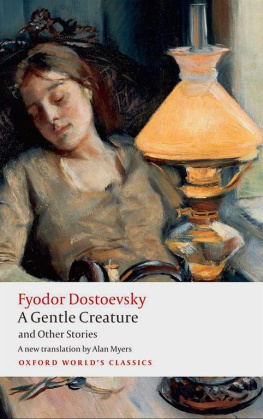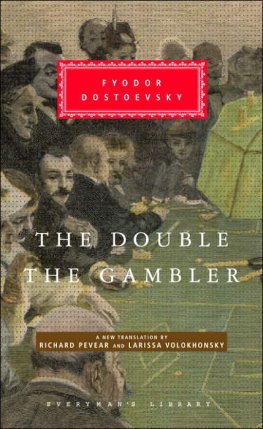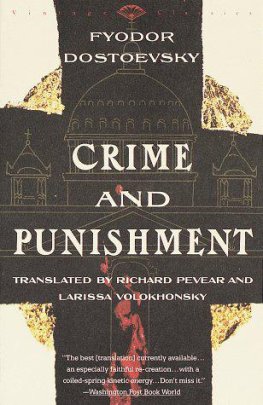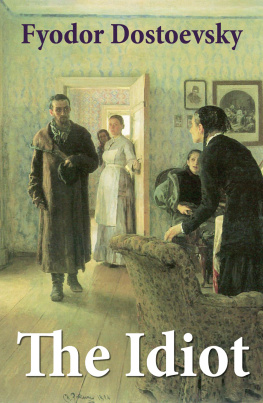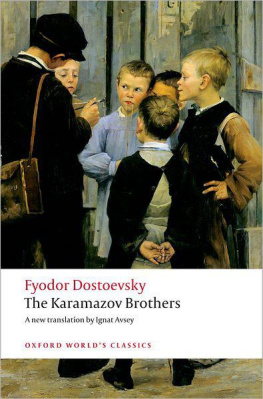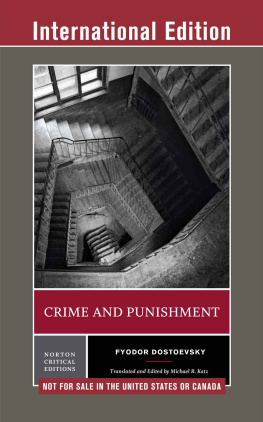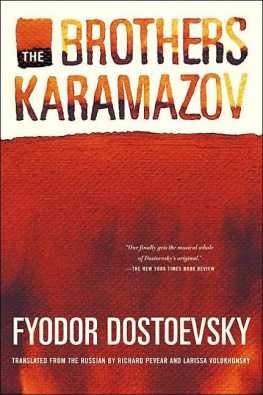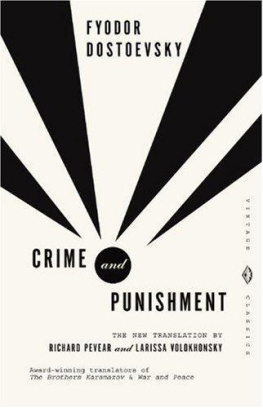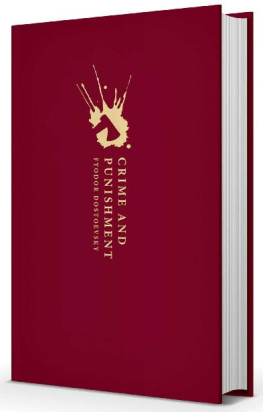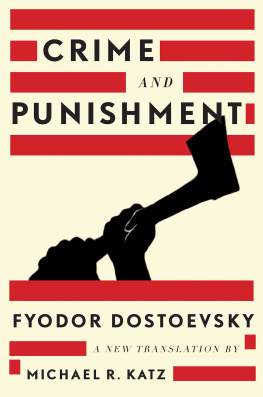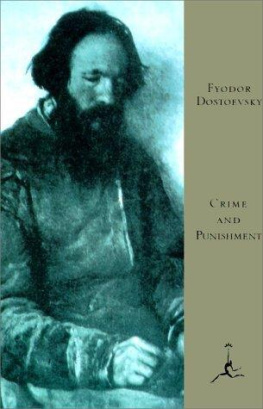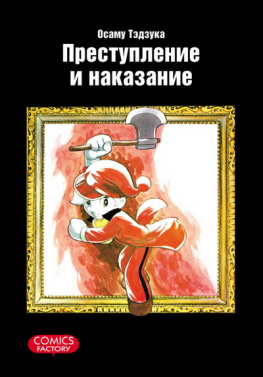Table of Contents
This eBook is copyright material and must not be copied, reproduced, transferred, distributed, leased, licensed or publicly performed or used in any way except as specifically permitted in writing by the publishers, as allowed under the terms and conditions under which it was purchased or as strictly permitted by applicable copyright law. Any unauthorised distribution or use of this text may be a direct infringement of the authors and publishers rights and those responsible may be liable in law accordingly.
Epub ISBN: 9781407053264
Version 1.0
www.randomhouse.co.uk
Published by Vintage 2007
17 19 20 18 16
Copyright Richard Pevear and
Larissa Volokhonsky 1992
This translation has been made from the Russian text of the Soviet Academy of Sciences edition, volumes six and seven (Leningrad, 1973). Quotations from Dostoevskys letters and notebooks in the foreword are from Konstantin Mochulsky, Dostoevsky: His Life and Work, translated by Michael A. Minihan (Princeton, N.J.: Princeton University Press, 1967).
This book is sold subject to the condition that it shall not, by way of trade or otherwise, be lent, resold, hired out, or otherwise circulated without the publishers prior consent in any form of binding or cover other than that in which it is published and without a similar condition including this condition being imposed on the subsequent purchaser
Crime and Punishment was first published in 1866
This translation was first published in Great Britain in 1993 by Vintage
Vintage
The Random House Group Limited
20 Vauxhall Bridge Road, London SW1V 2SA
www.vintage-classics.info
Addresses for companies within The Random House Group Limited can be found at:
www.randomhouse.co.uk/offices.htm
The Random House Group Limited Reg. No. 954009
A CIP catalogue record for this book is available from the British Library
ISBN 9780099981909
The Random House Group Limited supports The Forest Stewardship Council (FSC), the leading international forest certification organisation. All our titles that are printed on Greenpeace approved FSC certified paper carry the FSC logo. Our paper procurement policy can be found at: www.rbooks.co.uk/environment
Printed and bound in Great Britain by
CPI Cox & Wyman, Reading, RG1 8EX
About the Author
Born in Moscow in 1821, Fyodor Mikhaylovich Dostoevsky is regarded as one of the greatest writers who ever lived. Literary modernism and various schools of psychology and theology have been deeply changed by his ideas. He died in 1881 in St Petersburg, Russia.
This translation by Richard Pevear and Larissa Volokhonsky, was winner of the 1991 PEN/Book-of-the-Month Club Prize for Best Translation.
Richard Pevear has published translations of Yves Bonnefoy, Alberto Savinio and Pavel Florensky, as well as two books of poetry. He has received fellowships for translation from the National Endowment for the Arts, the Ingram Merrill Foundation, the Guggenheim Foundation, and a grant from the National Endowment for the Humanities in support of the translation of The Brothers Karamazov.
Larissa Volokhonsky was born in Leningrad. She has translated the work of the prominent Orthodox theologians Alexander Schmemann and John Meyendorff.
ALSO BY FYODOR DOSTOEVSKY
The Brothers Karamazov
Demons
Notes from Underground
The Gambler
The Idiot
The Devils
A Writers Diary (2 Vols.)
Contents
Foreword
I want to do an unprecedented and eccentric thing, to write thirty printed sheets [480 printed pages] within the space of four months, forming two separate novels, of which I will write one in the morning and the other in the evening, and to finish them by a fixed deadline. Do you know, my dear Anna Vasilievna, that even now such eccentric and extraordinary things utterly delight me. I simply dont fit into the category of staid and conventional people... In this typically ebullient fashion, Dostoevsky described to a friend the predicament he found himself in during the summer of 1866. He was then forty-five, and had behind him ten years of imprisonment and exile for antigovernment activities, the death of his first wife and of his closest brother Mikhail, and debts amounting to some 43,000 roubles. A year earlier he had gone abroad to escape his creditors with 175 roubles in his pocket and an agreement with an unscrupulous bookseller, F. T. Stellovsky, to produce a new novel for him by November 1, 1866, failing which (and Stellovsky hoped he would fail) all his existing and future works would become the booksellers property.
Fortunately, Dostoevsky managed to bring off this unprecedented... thing, though not quite in the way he envisaged. Work on one novel, which had been appearing serially in the Russian Herald since January 1866, continued to preoccupy him into the fall, and meanwhile not a word of the book for Stellovsky got written. Finally, on the advice of friends, he hired a stenographer, the young Anna Grigorievna Snitkin, who soon became his second wife. The Gambler, dictated to her in October, was handed to the bookseller on time, and in November he went on to finish the longer, serialized workCrime and Punishment, the first of the five great novels that crowned Dostoevskys artistic labors during the final fifteen years of his life.
The attempts of critics and literary scholars to define, or simply account for, what they have found in these novels may remind one of the Hindu parable of the blind men describing an elephant, each by feeling a different parta snake, a hog weed, a tree, a broom, a wall. Dostoevskys own summaries in his letters and notebooks tend to be dry, schematic, and therefore misleading, because no novels are less dry or schematic than these. Furthermore, he was always ready to revise his plans when new material, discovered in the process of writing, demanded it. Thus he wrote to his friend Baron Vrangel, in December 1865, that the story he had been working on for several months (the first version of Crime and Punishment) had grown into a big novel, in six parts. I had much of it written and ready by the end of November. I burned it all. Now I can confess it. I wasnt pleased with it myself. A new form, a new plan captivated me and so I began over again. Im working day and night, and for all that Im not working very much. A novel is a work of poetry. In order to write it, one must have tranquility of spirit and of impression... A novel, at least a Dostoevsky novel, is a work of poetrythat is, a simultaneous composition on multiple planesand the critics can therefore be forgiven their perplexity about where to take hold of it, since the first perplexity of criticism is that it must speak monosemantically of the polysemous.
But besides that, these were novels of a new kind, their multiple planes so divergent and even contradictory as to all but baffle definition. So much so that one line of criticism, rightly noting the dramatic technique and high seriousness of Dostoevskys writing, has called his late works novel-tragedies, while another, with equal rightness, finds their roots in Mnippean satire and a carnival sense of the world. Dostoevskys uniqueness as an artist lies in his invention of a form capable of combining such opposites, of sounding such depths (carnival laughter has as much depth as tragedy), while never ceasing to portray the contemporary world, the everyday in all the detail of its everydayness. Whats more, Dostoevskys novels refuse to stay put in their own period, where the novels of Tolstoy, Turgenev, Goncharov have settled; they leap out of their historical situation and confront us as if they had not yet spoken their final word.


